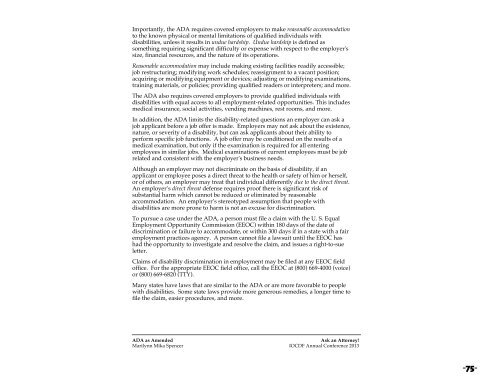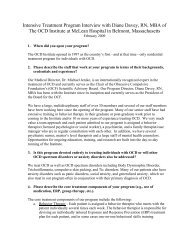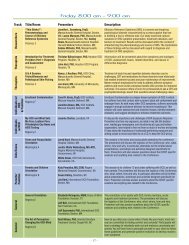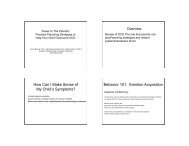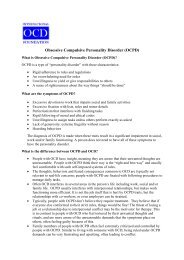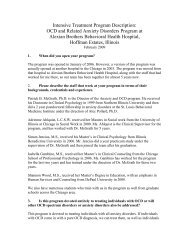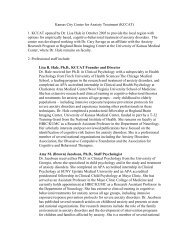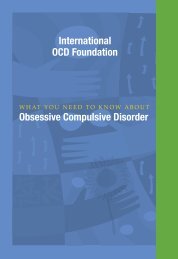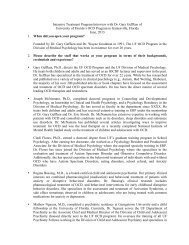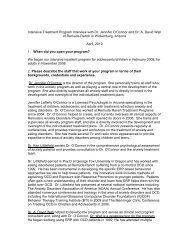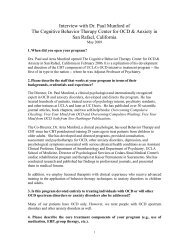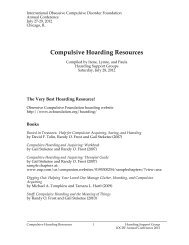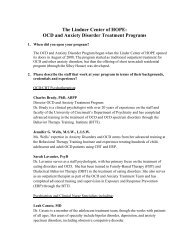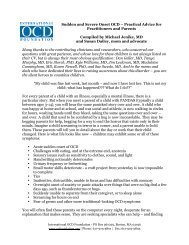perfectionism and - Obsessive-Compulsive Foundation
perfectionism and - Obsessive-Compulsive Foundation
perfectionism and - Obsessive-Compulsive Foundation
You also want an ePaper? Increase the reach of your titles
YUMPU automatically turns print PDFs into web optimized ePapers that Google loves.
Importantly, the ADA requires covered employers to make reasonable accommodation<br />
to the known physical or mental limitations of qualified individuals with<br />
disabilities, unless it results in undue hardship. Undue hardship is defined as<br />
something requiring significant difficulty or expense with respect to the employer's<br />
size, financial resources, <strong>and</strong> the nature of its operations.<br />
Reasonable accommodation may include making existing facilities readily accessible;<br />
job restructuring; modifying work schedules; reassignment to a vacant position;<br />
acquiring or modifying equipment or devices; adjusting or modifying examinations,<br />
training materials, or policies; providing qualified readers or interpreters; <strong>and</strong> more.<br />
The ADA also requires covered employers to provide qualified individuals with<br />
disabilities with equal access to all employment-related opportunities. This includes<br />
medical insurance, social activities, vending machines, rest rooms, <strong>and</strong> more.<br />
In addition, the ADA limits the disability-related questions an employer can ask a<br />
job applicant before a job offer is made. Employers may not ask about the existence,<br />
nature, or severity of a disability, but can ask applicants about their ability to<br />
perform specific job functions. A job offer may be conditioned on the results of a<br />
medical examination, but only if the examination is required for all entering<br />
employees in similar jobs. Medical examinations of current employees must be job<br />
related <strong>and</strong> consistent with the employer's business needs.<br />
Although an employer may not discriminate on the basis of disability, if an<br />
applicant or employee poses a direct threat to the health or safety of him or herself,<br />
or of others, an employer may treat that individual differently due to the direct threat.<br />
An employer’s direct threat defense requires proof there is significant risk of<br />
substantial harm which cannot be reduced or eliminated by reasonable<br />
accommodation. An employer’s stereotyped assumption that people with<br />
disabilities are more prone to harm is not an excuse for discrimination.<br />
To pursue a case under the ADA, a person must file a claim with the U. S. Equal<br />
Employment Opportunity Commission (EEOC) within 180 days of the date of<br />
discrimination or failure to accommodate, or within 300 days if in a state with a fair<br />
employment practices agency. A person cannot file a lawsuit until the EEOC has<br />
had the opportunity to investigate <strong>and</strong> resolve the claim, <strong>and</strong> issues a right-to-sue<br />
letter.<br />
Claims of disability discrimination in employment may be filed at any EEOC field<br />
office. For the appropriate EEOC field office, call the EEOC at (800) 669-4000 (voice)<br />
or (800) 669-6820 (TTY).<br />
Many states have laws that are similar to the ADA or are more favorable to people<br />
with disabilities. Some state laws provide more generous remedies, a longer time to<br />
file the claim, easier procedures, <strong>and</strong> more.<br />
ADA as Amended<br />
Ask an Attorney!<br />
Marilynn Mika Spencer IOCDF Annual Conference 2013<br />
-75-


